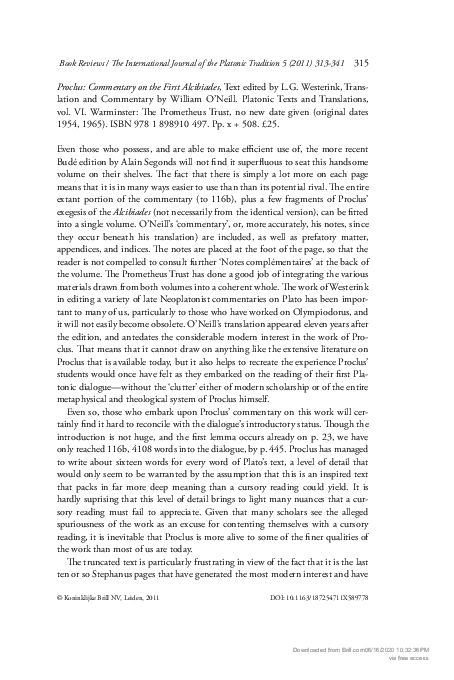Academia.edu no longer supports Internet Explorer.
To browse Academia.edu and the wider internet faster and more securely, please take a few seconds to upgrade your browser.
Proclus: Commentary on the First Alcibiades
Proclus: Commentary on the First Alcibiades
2011, The International Journal of the Platonic Tradition
Related Papers
The International Journal of the Platonic Tradition
Procli in Platonis Parmenidem commentaria Vol. III2011 •
The International Journal of the Platonic Tradition
Olympiodorus and Proclus on the Climax of the Alcibiades2007 •
The Classical Review (New Series)
Proclus Again (H.) Tarrant (ed., trans.) Proclus: Commentary on Plato's Timaeus. Volume I. Book 1: Proclus on the Socratic State and Atlantis. Pp. xii+ 346. Cambridge: …2008 •
The Irish Philosophical Journal
Review of J. Dillon and G. Morrow, trans. "Proclus’ Commentary on Plato’s Parmenides (1987)"1989 •
2017 •
This article presents a new edition with an English translation and a commentary of the first few columns of Philodemus’ Historia Academicorum (Phld., Acad. Hist. 1021, coll. 1*-1-2, 7). The edition is based on the multispectral photographs, inspection of the original papyrus preserved in Naples and the Oxford and Neapolitan disegni. This renewed study of the papyrus has made it possible to identify new readings and to call into question the text as reconstructed by Gaiser. This section of the Historia Academicorum is part of Philodemus’ biography of Plato and is an excerpt from Dicaearchus, a pupil of Aristotle. It addresses Plato’s innovations, presenting his dialogues as both a blessing and a curse for philosophy: their protreptic force attracted many people to philosophy but at the same time led many people astray, since they practiced it only in a superficial manner; by consequence, those ignorant people wrongly believe that they are real philosophers.
2016 •
I propose that a quotation appearing in Proclus' commentary on Plato's Timaeus, and attributed by Proclus to Parmenides, preserves an independent fragment of Parmenides' poem. Because the verses quoted share language familiar from other Parmenidean and Empedoclean lines, scholars have regarded Proclus' quotation as a conflation of lines by Parmenides and Empedocles, but when due allowance is made for the repetitiousness of Parmenides' poetry and for Empedocles' borrowings from Parmenides, there is no reason to assume any confusion on Proclus' part. In the third book of his commentary on Plato's Timaeus, in the course of explicating the Demiurge's bestowing a spherical shape upon his creation (Tim. 33b1-8), Proclus has occasion to quote from Parmenides' poem. He quotes something close to two hexameters which he attributes to Parmenides,and goes on to remark that Empedocles also said the same things. Proclus' quotation has received little attention in the scholarship on Parmenides, for a variety of reasons. The most important, perhaps, is that Proclus' passage is not listed among the sources for Parmenides' poem in Diels-Kranz, Die Fragmente der Vorsokratiker (= "DK"), so it is rarely read at all. 1 Even scholars aware of the existence of the passage have tended to pay it little attention, since the first verse and a half are familiar from other sources, while the remainder appears to confusedly substitute material from Empedocles. 2 I suggest in what follows that Proclus may not have been as confused as it has appeared and that the lines quoted may indeed be an independent fragment of Parmenides' poem.
The Forgotten Gifts of Hermes: The Latin Reception of Proclus’ Commentary on Euclid’s Elements, in Mediterranea: International Journal on the Transfer of Knowledge
The Forgotten Gifts of Hermes: The Latin Reception of Proclus’ Commentary on Euclid’s Elements2023 •
The present work offers an account of the Latin reception of Proclus’ Commentary in the first book of Euclid’s Elements (In Euclidem). The overall goal of this paper is to offer a unified historical and philological map as a ground-tool for understanding the Latin reception of In Euclidem from the early 16th century to the 17th century, which includes manuscript sources hitherto overlooked. I will deal with the three known complete translations produced by Bartolomeo Zamberti (1473–1543), Giovanni Battista Gabia (c.1500–1590), and Francesco Barozzi (1537–1604), as well as with five fragmentary translations embedded in the works of Giorgio Valla (1447–1500), Jerónimo Muñoz (1520–1591), Conrad Dasypodius (1532–1600), Federico Borromeo (1564–1631), and Johannes Kepler (1571–1630). Each of these translations and the intentions of their authors are discussed in chronological order. Five of them (following the fragment chosen by Kepler) are partially edited in the Appendix.
RELATED PAPERS
HAL (Le Centre pour la Communication Scientifique Directe)
How to Teach Literature in a French as a Foreign Language Class2021 •
International Conference "Rituals of Gender Staging and Performance in the Middle Ages", University of Bamberg, An der Universität 5, 3 de mayo de 2023
Fashion, Gender, and Performance in the Fifteenth Century: The Castilian Queens’ Wardrobe as a Case of StudyEnvironmental Monitoring and Assessment
Preliminary studies about the role of physicochemical parameters on the organotin compound dynamic in a South American estuary (Bahía Blanca, Argentina)2019 •
Nutrición Hospitalaria
Guarana (Paullinia cupana) consumption improves hepatic and renal parameters in alloxan-induced diabetic rats2019 •
2015 •
International Studies
Peripheric Realism versus Complex Interdependence: Analyzing Argentine and Mexican Foreign Policies since 19882001 •
2018 •
2023 •
Fertility and Sterility
Pregnancy outcome after te biopsy with fresh transfer or vitrification2012 •

 Harold Tarrant
Harold Tarrant